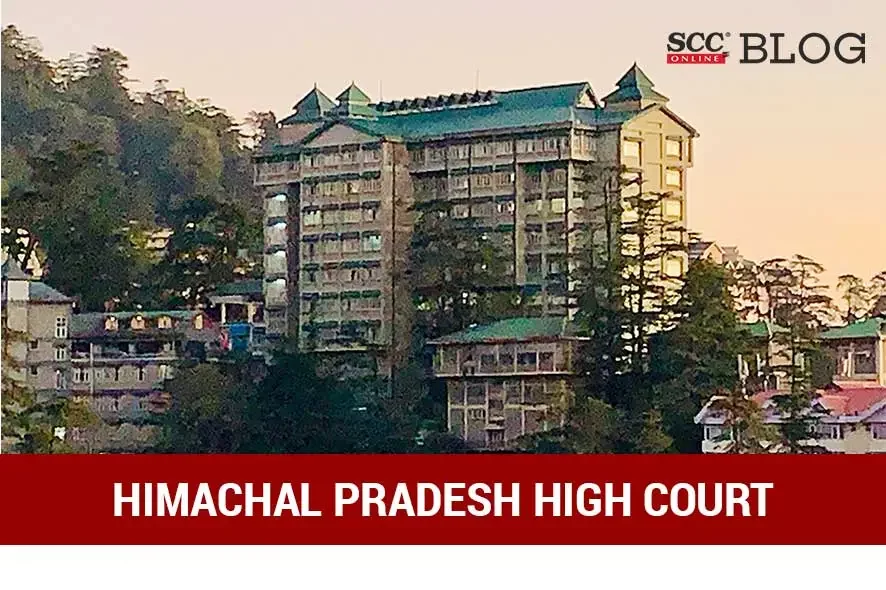Himachal Pradesh High Court: While hearing a batch of Civil Writ Petitions, wherein, the petitioners were seeking to declare Clause-6 of the Himachal Pradesh Prosecution Department, Assistant District Attorney, Class-I (Gazetted), Recruitment and Promotion Rules, 2017 (‘the Rules, 2017’) as ultra vires of the Constitution of India, the Division bench of Tarlok Singh Chauhan, Satyen Vaidya*, JJ., the Court dismissed the petitions and said that there was nothing arbitrary, discriminatory or illegal in the action of the respondents.
Background
The petitioners are Law Graduates and are practicing Advocates. They are aspirants to be appointed as Assistant District Attorneys (‘ADA’) in the Prosecution Department of the State. The petitioner’s case was that the respondent had issued an advertisement in 2021 for the recruitment of 25 people for the post of ADAs, Class-I (Gazetted) (on contract basis). Candidates between the age of 18-35 years were eligible to apply and such age was to be reckoned as on 01-01-2021. All the petitioners had crossed the age of 35 years as on 01-01-2021 and hence,were deemed ineligible. It was also stated by the petitioners that after Covid-19 Pandemic, no selection process for the recruitment to the posts of ADAs was conducted during 2020 and in the meantime, all the petitioners attained the age of 35 years.
The petitioners had also sought a relaxation of the prescribed age criterion in the Rules, 2017. The impugned Clause-6 of the Rules, 2017 provides for age limit for recruitment to the post of ADA in the Prosecution Department as ‘35 years and below’.
Court’s Analysis
The Court perused the letter of the Government of Himachal Pradesh dated 22-09-1983, whereby the age limit for direct recruitment to Class 1 and Class II posts was prescribed as ‘45 years and below’ and ‘35 years and below’ respectively. The Court noted that the Himachal Pradesh Prosecution Department, Assistant Public Prosecutor, Class-III (Gazetted), Recruitment and Promotion Rules, 1991 (‘1991 Rules’), had prescribed the age limit for direct recruitment between 21 to 35 years. The post of Assistant Public Prosecutor was re-designated as Assistant District Attorney and was made as Class-II (Gazetted) post. The Court also noted that as per notification dated 05-08-2003, the Recruitment and Promotion Rules (‘the 2003 rules’) for the post of ADA, Class-II (Gazetted) were notified after repealing 1991 Rules. In the 2003 Rules, the age for direct recruitment was prescribed as ‘35 years and below’. Subsequently, vide communication dated 20-04-2001, the criteria of age limit for Class-II officers were also prescribed as ‘45 years and below’ with effect from 01-04-2001. The 2003 Rules were repealed and substituted by the 2009 Rules. The Court said that the 2009 Rules were further repealed and substituted by the 2017 Rules and noted that both the times the age limit remained unchanged. In the meanwhile, on 10-11-2003, the post of ADA was made as Class-I (Gazetted) post.
Further, the Court noted that the age for direct recruitment to the posts of ADAs was proposed as ‘45 years and below’, however, the Council of Ministers had approved all other amendments except the proposed change in the age limit. Accordingly, the 2003 Rules were notified with age for direct recruitment as ‘35 years and below’.
The Court said that once the Cabinet had taken a decision not to accept the proposed age for the post of ADA as ‘45 years and below’ while approving the 2003 Rules, there was no requirement thereafter to place before the Council of Ministers the same proposal for enhancement of age time and again. The Court also said that the State Government was well within its powers to carve out exceptions for a particular category of post, in so far as the prescription of age limit by direct recruitment to such post was concerned. Therefore, the Court did not find any fault in the decision-making process. Thus, the Court said that the challenge to Clause 6 of the Rules, 2017 by the petitioners was without any substance and material.
The Court also said that the petitioners were unable to make out a case of hardship that they faced due to exceptional circumstances created by COVID-19 pandemic. Therefore, the Court said that petitioners could not claim such relaxation in the Rules, 2017 as a matter of right and hence, the writ of mandamus, sought by petitioners was not issued. The Court also did not find any arbitrariness, discrimination or illegality in the action of respondents. Therefore, the Court dismissed the said petitions.
[Rakesh Kumar v. State of Himachal Pradesh, 2023 SCC OnLine HP 739, Decided on 21-06-2023]
*Judgment Authored by: Justice Satyen Vaidya







